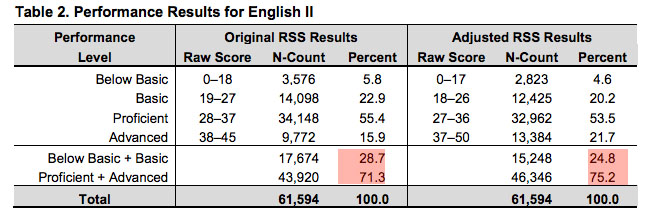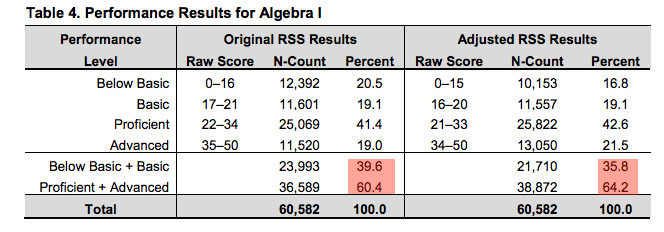What is DESE not telling us?
At this point in the year, parents, educators, and education reformers should be beginning to find out how well Missouri students performed during the last school year.
Unfortunately, as a result of concerns over the way two End of Course (EOC) exams were administered the Department of Elementary and Secondary Education (DESE) has decided to withhold key testing data from the public.
MAP scores show modest improvement, but still leaving students behind
State education officials started the school accountability season optimistically, touting student success in early August with the release of initial Missouri Assessment Program (MAP) scores for third through eighth-grade students.
The scores showed marginal statewide improvement over the previous year with 62.6 percent of students showing proficiency in English (up from 61 percent last year) and 48.8 percent showing proficiency in math (up from 45.5 percent last year). Despite the modest gain, that still means that that 37.4 Missouri students are NOT proficient in English and 51.2 percent of students are NOT proficient in math.
“We are pleased to see the progress students made across the board in the last year,” Commissioner of Education Margie Vandeven said in a statement. “Reading and numeracy skills are essential to ensuring that students are prepared for success after high school.”
State not releasing EOC scores
In late August, Vandeven announced that the state would NOT be releasing the results of the English II and Algebra I EOCs, citing issues with the test design and arguing that those issues would make it impossible to use the tests for year-to-year comparability.
That means that the results of those tests WILL NOT be used to grade individual schools or districts on how well they are serving their students, but they WILL be used in determining final student grades and A+ scholarship eligibility for the 64,842 students who took the English II test and the 64,852 students who took the Algebra I exam.
According to the state, the decision to not release the scores was a result of a recommendation from a group called the Technical Advisory Committee, which Vandeven describes as “nationally recognized assessment experts.”
Vandeven has referred media inquiries about the issue to Bill Thornton, general counsel for DESE, because the state is considering suing the testing company Questar.
The state has not announced how it will ultimately grade schools and districts without the data from the EOC courses.
This is not the first time that the state has not been able to compare test scores from year-to-year due to different tests.
In fact, the MAP tests, which Vandeen is so pleased with, have changed four times since 2015, but the state has released the results of those tests every year with a simple warning that it was not possible to compare the data to the previous year. While the state did not use year-to-year comparisons from those tests in assessing school accreditations, it did publically release the results.
Even if parents are not able to compare a school’s performance from year to year they deserve to have access to updated information which would allow them to see how different schools throughout the state performed on the same test.
Why is the state not releasing data?
A possible reason why the state is considering the EOC results good enough for student assessment and not good enough for school and district assessment might be found in a report Questar provided to the TAC in August. A full collection of information provided to the TAC this year can be found here.
According to that report, the state asked the company to review the performance results after noticing a decline in scores in English II and Algebra I.
“Specifically, the percent of English II students achieving the Proficient and Advanced level was 71.3 for Spring 2017 compared to 80.8 for Spring 2016 (a decline of 9.5%) and the percent of Algebra I students achieving the Proficient and Advanced level was 60.4 for Spring 2017 compared to 67.4 for Spring 2016 (a decline of 7.0%),” reads the report. “The TAC concluded that form effects were present for English II and Algebra I. Form H was administered in the Spring 2015 and 2017 and Form G was administered in the Spring 2016. The Spring 2017 results show a slight decline in students achieving the Proficient and Advanced level compared to the Spring 2015 results (a 3.2% decline for English II and a 2.4% decline for Algebra I).”
According to the report, the TAC requested Questar examine what would happen if it adjusted the score levels for Below, Basic, Proficient, and Advanced on each test. The requested adjustment resulted in improved rates of Proficient and Advanced scores, but still showed a decrease from last year’s results.
DESE needs to provide more information
Given the history of releasing test scores that are not able to be compared from year-to-year, and the troubling data provided by Questar which shows a dramatic decrease in test results, DESE needs to be much more transparent about what is going on with the Algebra I and English II EOC exams.
CEAM believes that DESE needs to immediately:
- Release district and school level scores from these assessments
- Explain in much further detail what caused this year’s test results to be unusable
- Explain why it decided not to release this year’s results when it has released other test results that are not comparable from year to year
- Explain why the test results are being used for individual student assessment but not for schools or districts
- Provide a clearer description of the makeup and authority of the TAC, including publicly posting all meeting minutes from their deliberations over this issue.
In an effort to fulfill our own dedication to school transparency and accountability, CEAM is in the process of filing a Sunshine/Freedom of Information request for this data to be made publically available.
« Previous Post: CEAM helps parents fight for better education
» Next Post: EAGLE College Prep opens new Gravois Park school


